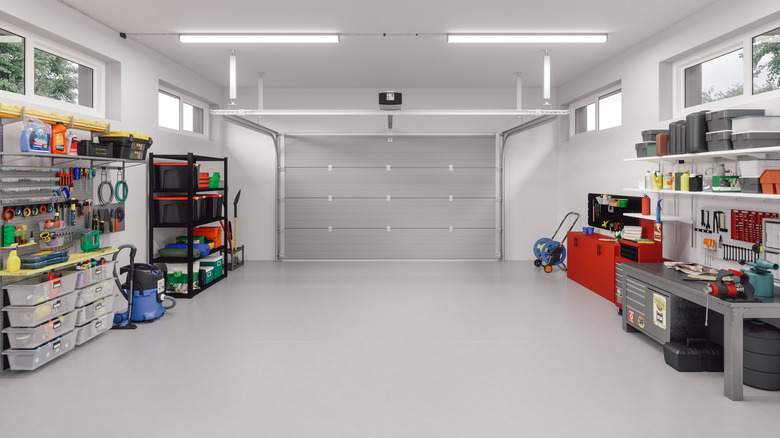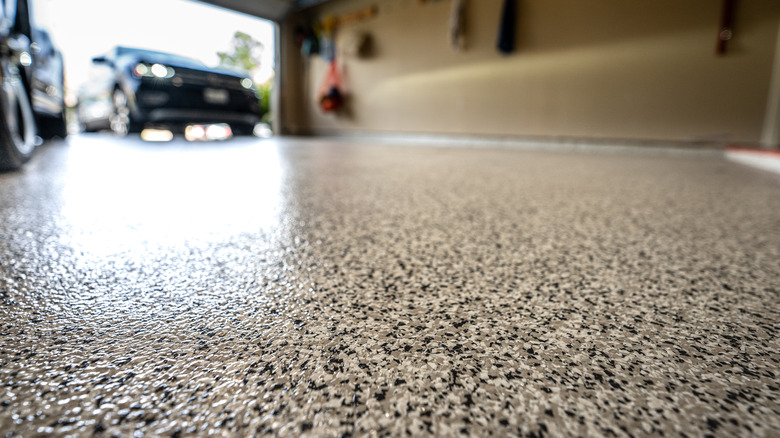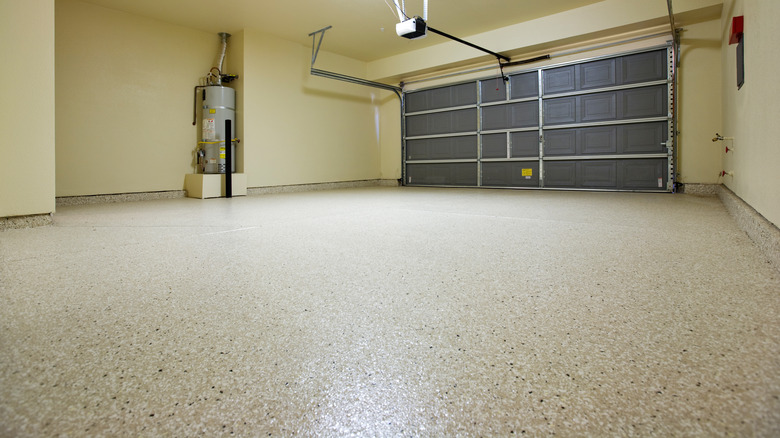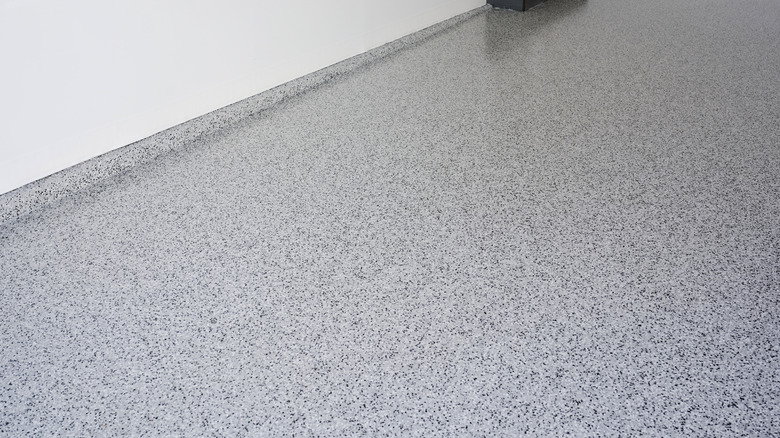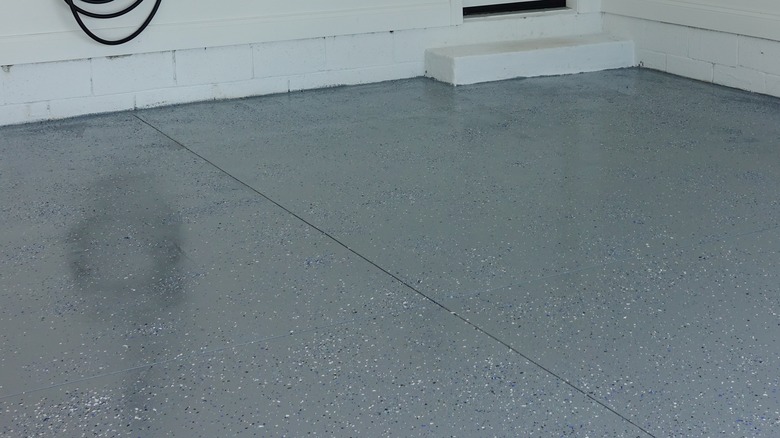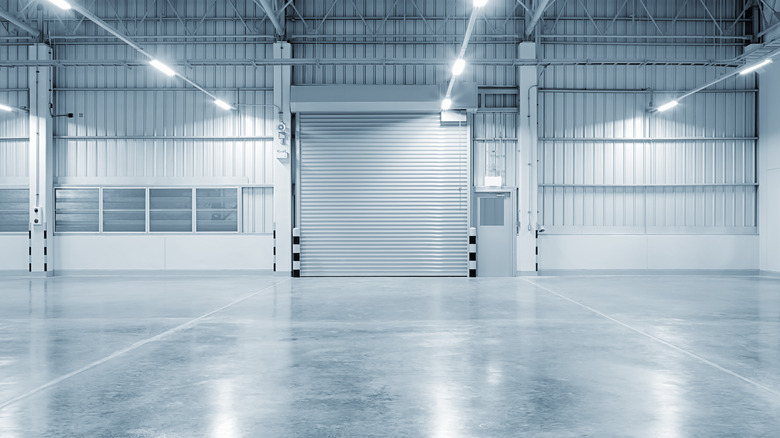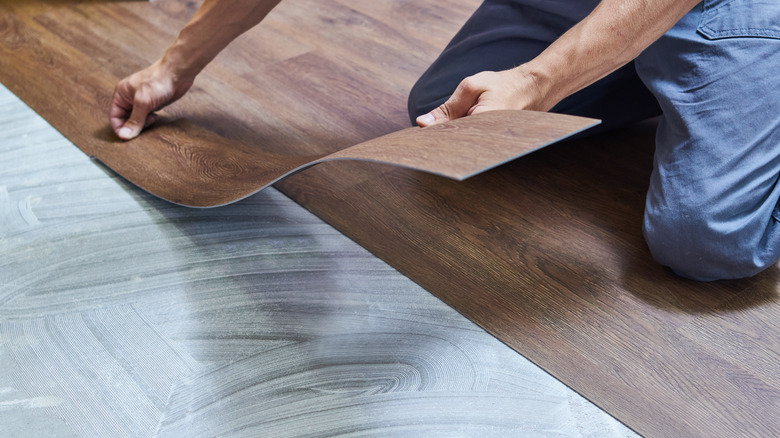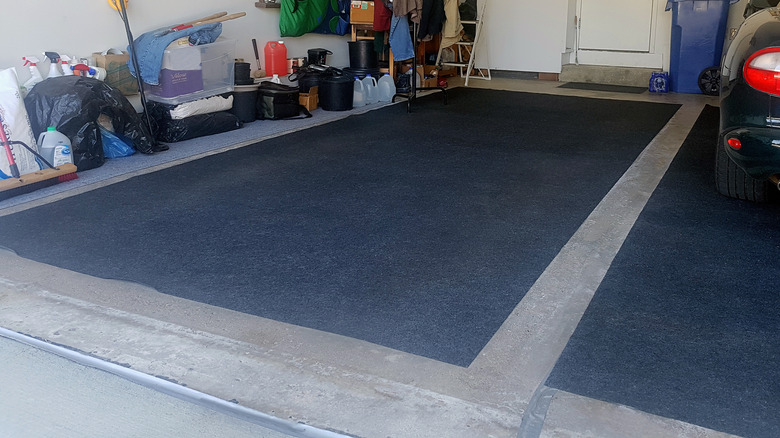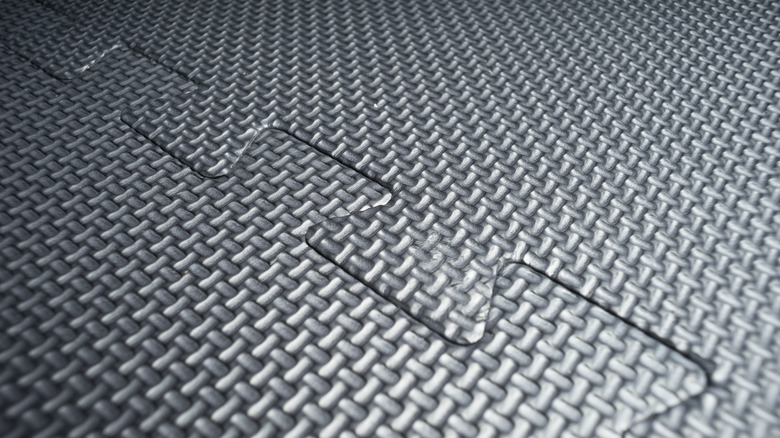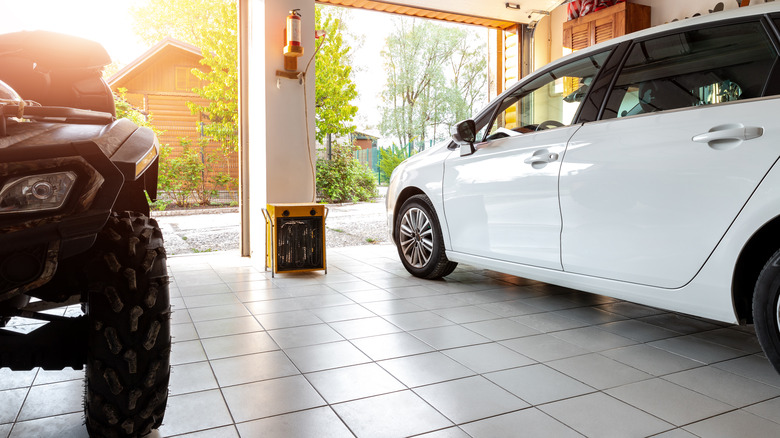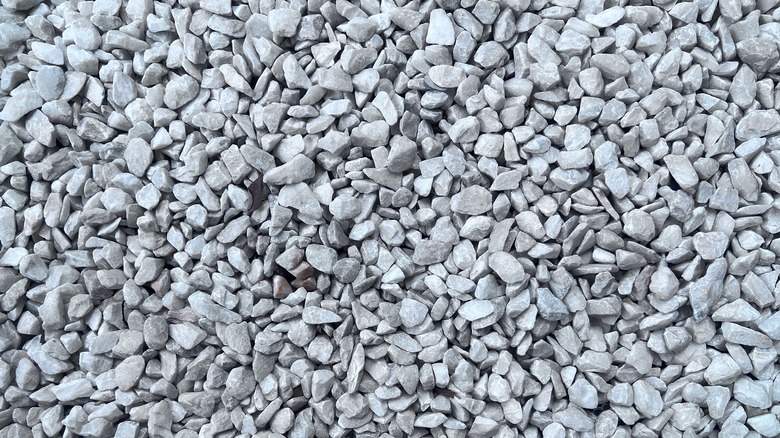The Best Flooring Options To Consider For Your Garage
There are many reasons you should upgrade your garage floor. Unlike any other place in your house, the garage floor deals with a lot. Between corrosive acids, oils, and grease, the floor has to be durable, tough, and stain-resistant. After all, it supports the weight of a vehicle with all the ramifications that entails. It also has to be easy to clean and not react negatively to chemicals. On top of that, the garage flooring has to be versatile to accommodate other designs you have for that space, including a gym or recreational area. In short, you're looking for a material that is heavy duty, resilient, and long-lasting — but doesn't damage the underlying floor.
It would also be great if the floor was easy to install so that you could do it yourself and save on labor costs. And let's not forget about the aesthetic appeal. Just because it's a place to store vehicles doesn't mean that the floor should be ugly. Concrete garage flooring options, for example, are tough and resist stains but lack the elegance of vinyl or epoxy. And, of course, there are pros and cons of painting the garage floor. Meanwhile, porcelain tiles check many boxes but need a professional to install them. Here's how to find the best flooring for your garage that satisfies your demands and meets your expectations.
Epoxy is durable and easy to clean but slippery when wet
When looking for a garage flooring, epoxy stands out as an attractive option. Made of a resin, an accelerator, a plasticizer, and a hardener, epoxy can be poured, troweled, or coated over many surfaces, including concrete. After it cures, the resinous material bonds with the underlying cement while acting as a protective sealant at the same time. In the garage, the epoxy flooring has many advantages. It is durable and resistant to wear and tear, and doesn't stain easily. And thanks to its smooth surface, the floor is easy to clean and maintain. There are epoxy flooring kits on the market that you can install yourself. However, they're thinner and have questionable quality compared to the ones offered by a contractor.
Although it may take several days for epoxy to cure, a small area like a garage can be ready to use within 24 hours after installation. But the resin coating isn't for every garage floor. It might hide the flaws in the concrete, but if the foundation is cracked, the epoxy will also chip and crack. The inflexible coating has a low tolerance for temperature fluctuations as well. And apart from the toxic fumes it emits during curing, the hard flooring can be slippery when wet.
Concrete sealer is easy to apply and insulates the floor
Since concrete is a porous surface prone to damage, sealers can treat many of its defects and render the garage floor suitable for parking vehicles. There are different types of sealants you can use on concrete floors in your garage. Made of acrylic, polyurethane, silicon, or linseed oils with solvents, among others, sealers can either be topical or penetrating. Topical sealers coat the surface with a thin film to insulate the concrete against liquids and abrasion. But penetrating ones interact with and bond with the concrete without changing its appearance. A sealed concrete garage floor resists staining, UV damage, humid conditions, and high temperatures. DIY kits are available and are easy to apply by yourself. It takes one to two days to fully cure depending on the temperature and humidity conditions.
The sealed floor is easy to maintain by sweeping, mopping, or vacuuming. On the downside, topical sealers need frequent applications since they lose their luster and wear off with heavy vehicle traffic. As for penetrating ones, they are permanent. Removing them could damage the underlying concrete. Also, watch out for solvent-based types since they emit toxic fumes that harm the skin and eyes during application.
Concrete stain for a flashy floor with plenty of color options
To protect the garage floor from damage, enhance its look, and extend its life, concrete stain is the right treatment. Acid staining is the oldest and most popular concrete stain type. It's made of hydrochloric acid, metallic salts, and water, which allow it to interact with the calcium in the concrete and create a permanent coating. Acid-stained floors are resistant to the damage of UV rays and heavy traffic. Water-based stains are another type to consider since they offer many color choices. Made of soluble pigments and water, it covers the concrete with a uniform and solid color without interacting with it. Concrete dye is the third stain type and is made of a solvent saturated with fine powders. The end result is transparent, preserving the natural hues of the concrete.
Each of those stain types has its drawbacks, though. Acid stains cause serious damage to the concrete surface, requiring a coating finish to the floor. It also takes more time to apply than the other stain options. Meanwhile, water-based stains tend to fade with time and traffic. They're also less resistant to UV damage than acid stains. Dyes also do poorly when exposed to sunlight and, depending on the type of solvent, they can be both a health and fire hazard.
Concrete polyaspartic coating repels stains and resists abrasion
Polyaspartic coating is another good choice for the garage floor. Made of resin and a catalyst to speed up the curing process, the material bonds with the underlying concrete for more durable insulation. At the same time, polyaspartic coating is resilient enough to absorb the impact of heavy objects falling on the floor as well as the weight of vehicles. It also makes the garage concrete more resistant to chemical erosion and abrasion. After the application, the polyaspartic floor takes only a few hours to set. It's easy to clean and maintain either by vacuuming or sweeping.
However, the presence of moisture in the concrete can prevent the polyaspartic treatment from bonding with the floor. This can impact the coating's durability and make it prone to fading. And while the material resists chemicals, it is vulnerable to strong acids. Another disadvantage is the limited color choices of this flooring. Likewise, problems in mixing and applying the coating could leave air pockets on the surface.
Polished concrete has a natural elegance with a glossy finish
If you choose to trust the inherent strength of concrete instead of treating it with chemicals and dyes, then polishing the slabs is all your garage floor needs. Apart from a grinding machine, a densifier that hardens the surface is all that is required to get the job done. Polishing concrete floors is a complex process that starts with grinding the slabs to open the pores and remove any previous flooring debris. Honing comes next, and finally, the floor is polished to give it a glossy finish. A sealer might be applied to the polished concrete to protect it against staining. The finished floor is long-lasting and elegant, and can serve as a workout area or any other purpose you desire. Maintenance is easy with regular sweeping and mopping.
Although no toxic materials are used in polishing concrete, the process can be messy and produce plenty of slurry. Additionally, the polished floor is susceptible to moisture penetration if it's not sealed. This can lead to mold buildup. And unlike other garage floorings, polishing the concrete doesn't hide or fix any innate flaws in the slabs.
Vinyl flooring for the repurposed spaces in the garage
If you want to convert a space in the garage into a living area, then vinyl is a plausible flooring option. Vinyl floors come in two types: vinyl composite tiles (VCT) and luxury vinyl planks (LVP). VCT is made of vinyl chips, limestone, and a plasticizer glued together, pressed, and cut into 12" square tiles. LVP is a multi-layer sheet with ingredients such as polyvinyl chloride resins, cork, UV stabilizers, and polyurethane, among others. Vinyl floors are long-lasting, with the scratch-proof topmost layer designed to repel moisture and stains. There are wide varieties of patterns and designs replicating the appearance of stone, concrete, wood, and marble floors. Ease of maintenance is another wonderful perk of vinyl flooring.
Since it tears easily, however, vinyl is no match for sharp or heavy objects. In theory, you can replace the damaged tile or plank, but in reality, glued vinyl is hard to remove. There's also a health hazard associated with newly installed vinyl floors because of the toxic fumes that come off them. To keep the floor from fading, make sure it doesn't get direct exposure to sunlight for long periods.
Mats are portable floorings with anti-slip qualities
When installing new flooring to protect the concrete is too much of a costly, time-intensive hassle, garage floor mats are the go-to solution. Easy to install and even easier to remove, the versatile mats are made of rubber or polyvinyl. With different sizes, colors, and textures, anti-slip mats keep oil and chemical spills away from the underlying flooring. Hiding the flaws in the concrete, some types absorb moisture, while others have grooved surfaces to carry unwanted liquids down to the drain. Depending on the material and thickness, the floor covers offer varying degrees of cushioning. As for maintenance, oil spills and stains can be wiped, scrubbed, or washed off.
Naturally, there are pros and cons of putting rubber flooring in your garage. The mats don't provide total protection for the concrete floor. Trapped moisture could turn the underside of the mats into a slimy and smelly mess. Liquid absorbent mats often get malodorous if the moisture and stains aren't cleaned up promptly. And if you're using lightweight mats as flooring, you need to secure them to the floor; otherwise, they'll roll when the vehicle moves in or out of the garage.
Interlocking PVC tiles provide strength, style, and traction
If you want a stylish floor in your garage that doesn't take a lot of skill or effort to install, PVC tiles were designed for exactly that. Made of either hard plastic or PVC, the interlocking tiles snap into place without the need for special tools or adhesives. They come in various sizes, starting from 12x12 inch squares up to 20x20 inch tiles, with thicknesses ranging from ½ inch to ¾ inch. With different designs, textures, and colors, the environmentally friendly flooring offers good traction and can handle the weight of vehicles. Many of these options have high resistance to UV rays and extremely cold temperatures. And if the flooring is damaged, only the affected tiles need to be replaced.
That said, these garage floors are vulnerable to liquid spillage. Although the tiles are waterproof, the seams allow liquid to seep into the underlying concrete. If exposed to sunlight for hours, the tiles can expand and buckle. To get around that, you could glue them to the subfloor. But maintenance can be an issue. Grime and dirt often accumulate in the seams, making cleaning the floor a headache.
Porcelain tiles for a heavy-duty floor that stands the test of time
Porcelain tiles maintain their good looks and resist chemical spillage and staining on the garage floor. They're made of a fine mixture of sand, clay, and aluminosilicate minerals treated with high temperatures and high pressure. This results in hard floors with anti-scratch surfaces that resist fading, wear and tear from heavy traffic, and freezing temperatures. The tiles can either be square or rectangular with different styles, colors, and finishes available. Once installed, the tiles don't require a finish and are quite durable. With the help of a porcelain tile cleaner, maintaining the floor is a breeze.
While porcelain tiles are tough and stain-resistant, the same can't be said about the grout lines. Even when sealed, the grout is susceptible to damage from the moisture in the concrete. Also, the flooring is not easy to install, and issues in installation could lead to cracking and chipping. As for the subfloor preparation, it can be intensive and costly. Because of the density of the tiles, the underlying floor has to be free from flaws and defects to support their weight. And concrete floors have to be level with the joints filled before porcelain tiles can be installed.
Gravel for a fluid and well-draining garage floor
A garage floor that shifts and sinks under your foot isn't for everyone. But gravel is right for you when you only use the garage to park your vehicle and you don't want to spend a lot of money on flooring. It's the perfect DIY project for a free afternoon. All you need is to pick the pebble size and color of your choice and spread them all over the floor. The eco-friendly and durable gravel resists the elements, adjusts to shifting underlying ground, and is practically low-maintenance. Liquids pass through this ground cover easily. And if it stains, you can replace the affected pebbles without breaking the bank.
But that's as far as a gravel floor will carry you. Gravel will always be an uneven flooring no matter how much work you put into it. And while it absorbs moisture, it also allows weeds to grow out of the floor. Pests might also hide between the pebbles and find their way inside the house. Dust and noise are two other byproducts of a gravel floor. And since the pebbles are loose and shift easily, you'll need to replenish the floor from time to time.
